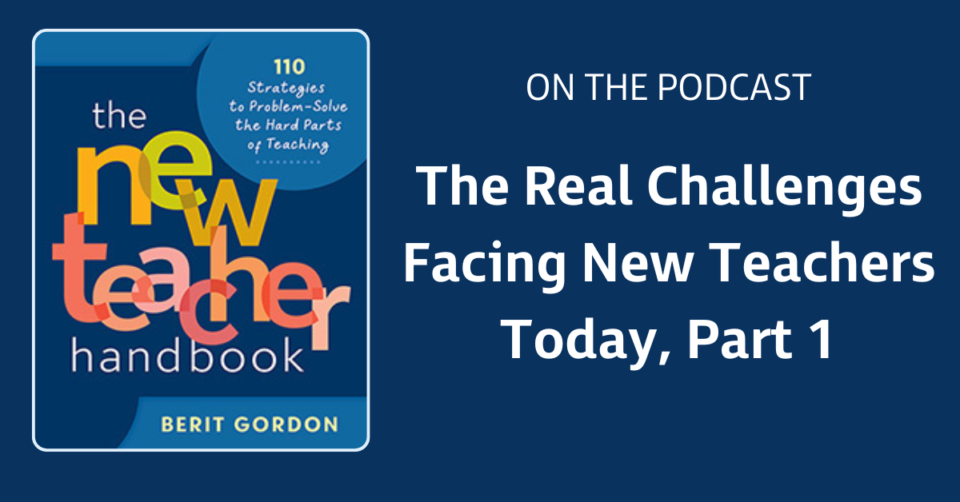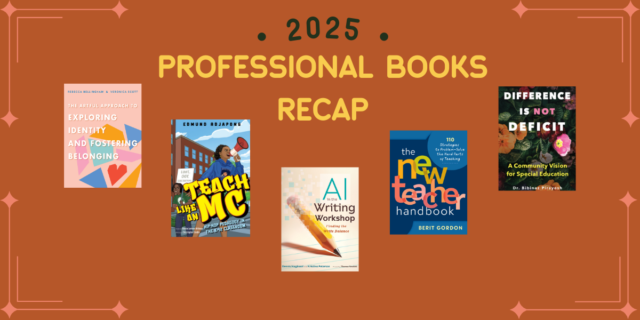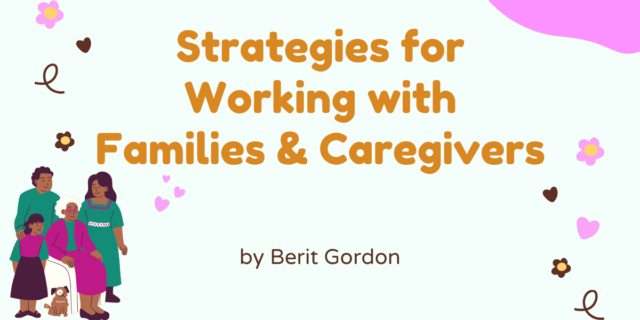
In this episode, Berit Gordon dives into the real challenges facing new teachers. A longtime educator in New York City public schools, and author of The New Teacher Handbook: 110 Strategies to Problem-Solve the Hard Parts of Teaching, Berit talks about the daily pressures, emotional strain and hurdles that often push passionate educators to the brink. But she doesn't just name the problem, she offers solutions.
You'll hear strategies for managing behavior, building routines, and protecting your energy when the system feels stacked against you. It's honest, it's hopeful, and it's exactly the kind of conversation new teachers and those who support them need right now. Berit is joined by her editor at Heinemann, Zoe Ryder White, and begins by reflecting on how the teaching profession has changed.
Transcript
Berit Gordon:
It was hard for me as a new teacher when I first started education a long time ago, and I remember just how much I wanted to do well and still felt like a failure many times. But I think what was hard then about teaching, there are new hard things. There are so many new things. There's more testing to handle, there's a more awareness of SEL, there's higher needs of students, and also there's so much more information out there. I had nothing to go on. I had to go find a teacher down the hall and ask them a question, and maybe I had a book from my graduate program. But now, teachers have so many things at the touch of a finger, but they're not all vetted. They're not all going to work for the problems that they're having.
But I think part of how the book evolved was I've been teaching and working with teachers for so long, but really after COVID, I became much more aware of how this whole teacher shortage thing is not just in the news. It was in the schools that I was working in. I remember being in a school in South Jersey and it was in a fairly rural area, and I came in and I was helping teachers with something about literacy, but then they said, "Oh, well by the way, we don't actually have teachers in about half of the classrooms." And I said, "What do you mean you don't have teachers?" And they said, "Yeah, no, we have a 50% vacancy rate in our content areas." And they had teachers on Zoom and they had an aide supervising the class, and they were desperate to get teachers in there, and they were getting new teachers every year.
And around the same time, that was when my husband changed careers and he went through an alternate route teaching program, and he had tremendous support. He had caring people, he had mentors, he had people trying to help him. And despite all of his good intentions and incredible hard work, that year almost broke him. It was nothing compared to when I first had my first new teaching experience. And then, I've been a new teacher over and over again. Every time I change schools or change my position, it feels a little bit like I'm new all over again. And I was just new recently at a new school in the last year, and I don't know what I would have done without a couple of people who helped me. And they said, "Here, use some of what I have and my plans." I was drowning. And I have all of this experience and all of this wisdom and still it was incredibly hard, so much harder than I thought.
And I would end so many classes thinking, "Oh, I meant to do this," or, "I meant to do that," and it didn't happen. And how do you drive yourself home still feeling like, "Oh, I've got what it takes to do this job," and not kind of beating myself up for everything that didn't get done? And that's what I keep hearing from new teachers now, that it's always been a hard job to do well, but it feels in many ways that it's harder, despite a lot of people trying to support them, and despite good intentions from administrators, a lot of them are drowning. And I thought, yeah, they need almost a survival guide. And that survival guide has to help them feel like, "Not only can I do this, but it's worth doing and it's worth getting better at. And I've got energy and I've got resources, and I can keep improving bit by bit."
Zoë Ryder White:
So you work with a lot of new teachers now. You're in a lot of schools, a lot of different kinds of schools working with a lot of different kinds of new teachers. Right?
Berit:
Yes.
Zoë:
And I guess I'm wondering what kinds of hard things do you hear about the most? What are the top things on brand new teachers or newish teachers, even? What's at the top of their mind or spirit?
Berit:
A lot of them just say it's so much harder than they thought it would be, and what they want to see happen in their classroom isn't happening. But I think the big issues come down to management. They're struggling to get routines going in their classroom. And the really joyous part of teaching, the fun part is when you feel like, "I got something across, my lesson plan happened," and they're not even getting to that part because they're drowning in what come up as behavior issues.
And they're struggling with that and they're trying to diffuse all these conflicts in the classroom, and they're also really feeling pressure to cover a lot of content. And I think sometimes in that panic to get through the curriculum, they're forgetting how to pay attention to the kids in front of them. And so there's a disconnect. And so they need some ways to be able to really see the kids in front of them and feel like that pacing guide is something doable that they can fit it in. And often, the two just don't seem possible.
Zoë:
Right. And finding ways to regulate themselves too, right? So that they can be their best selves and bring their best selves right into the classroom also.
Berit:
No, they come in and they're dealing with kids who are dealing with emotional overload, and they themselves are in the same boat. They're exhausted, they're hanging by a thread, they didn't get enough sleep. They stayed up with you 20 tabs open trying to find just the right thing to teach the next day, and, "Where is the answer? And how do I come in and still be sort of fresh and attentive and really show that you like students?"
And I think for a lot of them, of course, they want to like students, but then when they're beaten down by everything, some of that love for kids and for teaching evaporates. And then I see also administrators saying it's really hard to get teachers to commit to the hard work that being a new teacher entails. And I see a lot of teachers saying, "Yeah, no, this is too much. I'm going to just scale it back and I'm going to be out the door at 3:05." And then things just get harder and harder.
Zoë:
Right. The more you disconnect, the more disconnected everything going on in the classroom feels. Right? So management, connection self-regulation. How would you say The New Teacher Handbook addresses some of those things in ways that new teachers can find approachable or ways that seem doable?
Berit:
Yeah. One thing I know is that I work with so many teachers, and the one thing I really try to do is, "I am not talking down to you. I'm going to meet you where you're at." Just like a new student who comes in and maybe their learning curve is really steep. I am not going to say, "Well, you better get caught up to speed," because that just feels like, "Forget it. You're asking me to jump over this high bar." And instead, "Let's find out what you do have in place, and let's take it a little bit lightly. Let's try to have smile at this and still enjoy kids," and find little, little quick wins across the day so that they don't feel so overwhelmed by it all.
And I think too, new teachers are really looking for something practical that they can do right away. If I had a nickel for every new teacher who says, "Please give me a long book that I have to read," I would have no nickels, none, because nobody wants that. They're like, "Give me something quick. Give me a quick strategy I can try."
Zoë:
That's something that I thought was really appealing about the book when it was just an idea, when we first started talking about it, that you were aiming to offer really quick things, both in terms of the reading load for new teachers, they can flip to a targeted strategy that's going to address something that they're having a problem with. Everything's sort of based around actual questions that you've gotten from new teachers.
And then each strategy has just really bite-sized bits of information. It's great in-depth pedagogy, but you make it... That's something that I've appreciated about this book from the beginning, you make it really easy to get the gist of what's going on. And do you want to talk a little bit about some of what those components of the strategies are in the book, and maybe the other pieces that go along with the book, too, that are just different access points for new teachers?
Berit:
Yeah, and in general, you're right though. It's just everything is very quick and user-friendly, because that's another different thing that I used to have an entire prep period that was protected. And a lot of new teachers now, their prep period ends up being a coverage or they have a duty, or they need to be part of a committee and they feel like they don't have any time, and a lot of them really don't. And so, it's nice to have just a quick at a glance, "Here's a few quick things you can try." Or I love that we put in these scripts of what to say.
So if a strategy is really conversation-heavy, how to diffuse a escalating conflict with a student, "What can you say?" So you actually have sentence starters right there. You almost have a script that you can be ready and empowered with, so the next time a kid is about to blow, you really feel like you're ready. You've got something in your back pocket. Or if you're going to navigate a tricky conversation with a caregiver who's upset, you have that script ready to go.
So, all the scripts, the really quick videos, the demo videos, the very actionable language is designed to give new teachers something very quick. When I'm thinking of recipes, when I go online and I'm looking at recipes, and as soon as it looks really involved, I'm ready to just say, "I think I'll get takeout instead." And so I think when I am hungry, and I don't have a lot of time and I don't have a lot of energy, I want something that's almost like, "Just cobble together these three ingredients and you'll come up with something edible."
Zoë:
So as you work with new teachers and all these different kinds of schools, what are some common scenarios that you actively work on with new teachers? Not just what kinds of things are difficult, but what sort of bigger picture scenarios do you see new teachers needing support with?
Berit:
Well, the very first chapter is just all about how to, I wouldn't even say how to stay happy as a teacher because that feels like a high bar, but how to just stay reasonably content in your first year. And a lot of that is just very practical time management strategies and not self-care. While I would love teachers to go do yoga and meditate and take bubble baths, it's not really about self-care. It's very practical about how do you use your time well? How do you prioritize? With very, very specific moves that have helped me so that I know when I'm looking at a sea of grading or an endless to-do list, it doesn't just have me rocking in the fetal position in the corner. I can feel like, "Okay, I've got this. I can chip away at it and I can let some things go and the world will keep turning."
And so, that's one of the things that I think new teachers need some really practical support on, is decision-making and prioritizing, and how to use their time. And how to, without necessarily leaving at contract hours because I think that's a slippery slope, but how to find a work-life balance so it's not the teacher staying until 8:00 PM, but it's also learning how to invest, as I suggest, minimum of you need 10 hours a week outside of your contract hours in order to come in and be able to say to kids, "I'm so happy to see you," and you really mean it because you are, you feel good about being there. You're rested and you're prepared.
And then I would say some other common scenarios really come down to how to establish routines and relationships, and they go hand in hand, but without the routines, a lot of new teachers are flailing. And I think, again, they feel so pressured to cover the content which they need to do. They have to address the standards. "But how do I do it while first prioritizing that my students come in and they know where to go and what to do, and I am not constantly reminding and directing and redirecting students?" Because that's when teaching is just no fun at all. And of course, students act up because that's miserable for them, too.
For instance, I had a new teacher say, "Well, I heard that I should say, 'I'll wait.'" And she said, "I basically waited the whole period and kids just talked over me until the bell rang." She said, "I don't know, but someone told me to do that, and so that didn't work." And so she needed really practical steps about how to help kids sit down and be quiet, and listen when it's time to listen and talk when it's time to talk. And so we did that, and within a couple of weeks, she had a completely different classroom. And she was doing it alongside other teachers. Everyone tried to really look back at routines.
And then even though they slowed down and they focused on these routines, they made up so much time within the weeks after because then students were coming in, they were listening when it was time to listen, and they were enjoying their students so much more. So I would say those first things of just, how do I manage a teaching life? And then how do I establish routines? And along with it, how do I establish rapport with students, relationships with them, relationships with caregivers? Which makes all the difference even with older students.
A common scenario that I find really exhaust new teachers is they are enabling students. Out of good intentions, they're holding students' hands and then getting frustrated of, "Why are they so needy? I don't know. I'm just constantly rescuing them and they're not doing anything." And I get it. I get both sides. You want to feel like you're doing your job because you're helping them, but then you're exhausted because they're being really passive. So another central goal is, "How do I shift that balance so students are working as hard as I am?"
Everybody's doing, everyone's busy, everyone's working. And again, when they work on that shift with these strategies, I see these new teachers, they have such a newfound love of their job. They're not leaving exhausted because everyone has been productive. And they can keep going. There are goals about feedback and assessment and talk and collaboration, but really, even if they were to get those first five goals down by revisiting strategies as needed, I think most new teachers would end the year feeling like, "Yeah, I did okay, and my students got something out of this year, and I'm kind of excited to come back next fall."
Edie:
Thanks for tuning in today. You can order Berit's new book that is just packed with strategies for new teachers at blog.heinemann.com. This is where you can also read a full transcript. And this is episode one of a two-part series, so make sure to check out the next episode as well.
About the Author

Berit Gordon brings many years of teaching experience in New York City schools as well as in the Dominican Republic to her literacy coaching work. She is a graduate and former instructor at Teachers College, Columbia University. Berit is the author of No More Fake Reading, and The Joyful Teacher. Whether running workshops, leading literacy coaching sessions, or working in classrooms, Gordon strives to help students fall in love with reading and writing, and to lay the groundwork so they are experts at both for life. She lives with her family in Maplewood, New Jersey.
You can connect with her on her website at BeritGordon.com.


